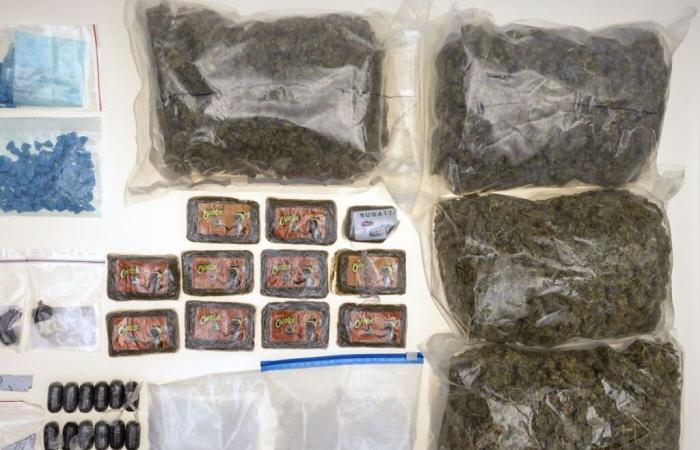Keystone-SDA
A vast anti-drug operation in Val de Bagnes resulted in the arrest of around fifteen suspected traffickers, suspected of having sold record quantities of drugs. The turnover would exceed one million francs.
This content was published on
04 November 2024 – 20:00
(Keystone-ATS) These individuals, French nationals, operated mainly in the Verbier station. With no apparent link, they did not work together, but in the same territory, the Valais cantonal police told Keystone-ATS on Monday, emphasizing “having never arrested so many people in connection with drugs in a single place”.
The in-depth investigation by the narcotics section revealed the sale of very large quantities of products, including 10 kilos of cocaine, as well as ketamine, ecstasy and cannabis, in smaller quantities. Eight of the suspected traffickers are currently still in detention “as there is a risk of flight for defendants who are not domiciled in Switzerland”.
In addition, significant drug seizures were made from the suspects’ homes and vehicles. In total, the police got their hands on 3 kilos of cannabis, several hundred grams of cocaine, hundreds of ecstasy pills and ketamine as well as several tens of thousands of francs.
Questioning of consumers
The police operation also resulted in the arrest of around twenty consumers, some of them resellers. Most are from France, but there are also locals among them, the cantonal police still report.
The Public Prosecutor’s Office has opened an investigation. Suspected traffickers face penalties of deprivation of liberty of several years and expulsion from Swiss territory for a minimum of 5 years for foreign nationals. Investigations are continuing and should lead to other arrests, the same source notes.
The cantonal police collaborated with the French authorities who arrested and/or interviewed people in France. In Switzerland, she requested the support of her counterparts in the cantons of Vaud and Neuchâtel where arrests and searches were carried out, certain perpetrators who were active in Verbier having changed their place of residence.
“Democratization” of cocaine
Since 2017, the number of reports for substance use has remained relatively stable, according to law enforcement. The type of products consumed has, however, evolved.
In 2017, 68% of denunciations were linked to cannabis products, 9% concerned stimulants (a term grouping together several substances, the most common of which are cocaine, crack, amphetamines) and 21% concerned polydrug addiction. Six years later, in 2023, the share of denunciations for cannabis has decreased to 55%, while that of stimulants has doubled to 18%. Mixed consumption, or polydrug use, remains stable at 24%.
The increase in the presence of cocaine in Valais corresponds to the situation on a national and international level. This “democratization could be explained by its increased availability and the significant drop in prices, making it accessible to more modest backgrounds, particularly students,” estimates the police. The concentration of a wealthy clientele or the presence of party venues could also have their impact.
Several months of investigation
The narcotics section began its investigation in October 2023 and completed it in the summer of 2024. “It was meticulous and patient field work which involved the participation of around forty people (investigators, gendarmes, police officers, corps border guards),” the police further specifies.






